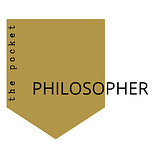Thought
Sleep is much more intelligent than we have previously considered. It not only takes individual pieces of information and saves them and protects them, but sleep can intelligently cross-link new pieces of information together. As a result, you can start to extract commonalities and develop novel insights into problems that you were having the day before.
—Matthew Walker in an interview with Jill Suttie

Application
Today we’re kicking off our two week series—this week on the philosophy of non-doing, next week on the philosophy of action.
And what better place to begin an analysis on non-doing than with sleep?
If we can take a step back for a moment and consider the implications of sleep from an evolutionary perspective it’s pretty remarkable. When we sleep we’re not gathering food, finding a mate, keeping our young safe, or warding off predators. In fact, if a predator were to find a human (or any animal for that matter) in a state of sleep it could easily be fatal.
And so often scientists and philosophers have wondered why we sleep. Some suggesting we evolved it as a time for necessary repairs/healing, some focusing on dreams and the dream state as a connection to other dimensions or cosmic wisdom.
In some ways those things are all true save one: humans didn’t evolve sleep, in fact sleep predates our species.
That is an incredible fact, that sleep is something much bigger than even our species, our biohacking, and our innovation. It’s a universal need. Even earthworms do it!
In terms of how much we need it, let’s consider this scale:
You can only last a few minutes without oxygen
A few days without sleep
A few more days without water
A few weeks without food
Have you ever thought about how important sleep is? The only more important automatic function in our body is breathing (which we’ll cover tomorrow).
You need to sleep as much as you need water. And yet, sleep is so often where we try to “get ahead,” to “shave time,” to “squeeze in” a few minutes of pleasure or work at the end of the day.
And on the other side we’re culturally obsessed with “disciplined” influencers who can wake up everyday at 4:30am and then grind out a day if intense productivity before hitting the bed as late as possible.
But this culture directly contradicts our anatomy. We spend roughly a third of our life asleep, and this state is far more healthy, productive, and healing for us than any of the stress, strain, and danger we put ourselves through when we are awake.
So the real question isn’t “how do I sleep as minimal as possible,” or “why do I need sleep,” it’s actually “why am I awake?”
And this subtle perspective shift is where I want to land today, and spend a few more minutes building that out in the backstory below.
Backstory
Ok, in this segment we’re going to cover some science, some philosophy, and of course talk about dreams.
Most of today’s post is inspired by Neuroscientist Matthew Walker. His work is really accessible, though I’m always a fan of a good Masterclass if you have access to the platform. His passion and detailed analysis of sleep will undoubtedly change the respect you have for the 8 hours you spend unconscious a day.
So much of his work is focused on asking questions about sleep that have long been considered understood. Like a good scientist, Matthew didn’t settle for half truths when we sensed there was much more to the story.
His work on sleep has not only helped us understand why we sleep, but also how to get better sleep. If you happen to be one of the millions of folks who struggle to sleep, his work could be extremely beneficial.
But I really want to hone in here on dreams—what is this psychotic state we reach every night when we hallucinate the most unnatural or impossible visions that somehow mean something to us?
And this points to the most foundational reason that sleep supports us—our unconscious capacity for wisdom. When we hit the non-REM deep sleepstate that Walker mentions in the quote above, some really special work gets done by the deepest recesses of our unconscious mind.
In this state, our bodies are actually paralyzed, while our mind begins rummaging around for memories that are etched deeply in our brains from the day or week before. And then, somehow, it begins “stitching” together other memories and helping our brains make sense of the incredible amount of information we received the day before.
In a way, this is where your wisdom, ability to make connections, be inspired, and solve problems comes from. Sure you can think about a problem long and hard in your waking life, but there is powerful wealth of knowledge and connections inside your brain you can only access during sleep, which your brain will reveal to you if you are willing to give it rest.
And what’s more, this process often becomes an emerging phenomenon of dreams which sort of display certain elements of that organizing process.
This makes me ponder the tradition of Shabbat or Sabbath which emerged within ancient Judaism still practiced by many observing Jewish people today (as well as some Christian sects).
Sabbath is a practice which forces our bodies into a naturally restful state to induce healthy sleep. It was a time to create space for our subconscious to do work that our waking mind seems to tamp down with incessant information, thought, and analysis.
What’s more, when waking up from sleep, many Orthodox Jews still practice hand washing as they believe they are transported to other realms where they receive visions, wisdom, and messages in their dream state. The hand washing is meant to purify themselves as they return to our realm. It acknowledges the sacred nature of sleeping.
And in many ways, science affirms this profound sensitivity that the Orthodox Jewish community is tuned toward—that sleep is a state of profound, transcedant wisdom.
So the next time you are stuck on anything in life, think of the Taoist parable,
A farmer wanted to help his crops grow faster.
So early one morning he went out to his field and, one by one, began pulling the shoots up by half an inch.
When we was done, he stood up and marveled at how much taller he had made his crops than his neighbors, how much faster they were growing.
But by the end of the day, he was devastated as they had all died.
In many ways, many of us approach life like this farmer, worrying and beating our head against our stresses and problems. Wishing things would go faster and we had more time to get it all done.
In truth, when we “sleep on it” our greatest reservoir of wisdom is waiting to show us the way, even if it means turning off for 8 hours.
Perhaps our unconscious wisdom is greater than we have realized. Perhaps sleep is actually our greatest source of intelligence.
Until tomorrow friends, I hope this was an enjoyable read.
Make sure to share with your friends who’d find this interesting, and leave a comment with your thoughts!
-Matt
References:
https://greatergood.berkeley.edu/article/item/why_sleep_your_way_top
https://www.sleepdiplomat.com/
https://www.chabad.org/library/article_cdo/aid/649941/jewish/Why-do-we-ritually-wash-our-hands-when-we-wake-up.htm
https://tao-in-you.com/sucess-by-doing-nothing/














Share this post